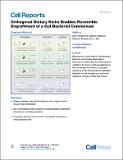Orthogonal Dietary Niche Enables Reversible Engraftment of a Gut Bacterial Commensal
Author(s)
Kearney, Sean M; Gibbons, Sean Michael; Erdman, Susan E; Alm, Eric J
Download1-s2.0-S2211124718311227-main.pdf (2.430Mb)
PUBLISHER_CC
Publisher with Creative Commons License
Creative Commons Attribution
Terms of use
Metadata
Show full item recordAbstract
Interest in manipulating the gut microbiota to treat disease has led to a need for understanding how organisms can establish themselves when introduced into a host with an intact microbial community. While probiotic or prebiotic approaches typically lead to a transient pulse in abundance of an organism, persistent establishment of an introduced species may require alternative strategies. Here, we introduce the concept of orthogonal niche engineering in the gut, where we include a resource typically absent from the diet, seaweed, to establish a customized niche for an introduced organism. We show that in the short term, co-introduction of this resource at 1% in the diet along with an organism with exclusive access to this resource, B. plebeius DSM 17135, enables it to colonize at a median abundance of 1%, frequently increasing in abundance to 10 or more percent. We construct a mathematical model of the system to infer that B. plebeius competitively acquires endogenous resources. We provide evidence that it competes with native commensals to achieve its observed abundance. We observe a diet-dependent loss in seaweed responsiveness of B. plebeius in the long term and show the potential for IgA-mediated control of putative invaders by the immune system. These results point to the potential for diet-based intervention as a means to introduce target organisms, but also indicate potential modes for failure of this strategy in the long term.
Date issued
2018-08Department
Massachusetts Institute of Technology. Department of Biological Engineering; Massachusetts Institute of Technology. Department of Civil and Environmental Engineering; Massachusetts Institute of Technology. Division of Comparative MedicineJournal
Cell Reports
Publisher
Elsevier
Citation
Kearney, Sean M., Sean M. Gibbons, Susan E. Erdman, and Eric J. Alm. “Orthogonal Dietary Niche Enables Reversible Engraftment of a Gut Bacterial Commensal.” Cell Reports 24, no. 7 (August 2018): 1842–1851.
Version: Final published version
ISSN
22111247